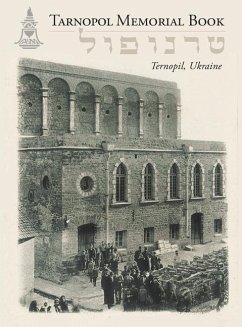Tarnopol is a city in western Ukraine roughly 80 miles east of Lviv. During its history, it changed hands several times. It was annexed to Austria in 1772 as part of Galicia and remained under Austrian rule until 1918 when the empire collapsed. During World War I the city passed from German and Austrian forces to Russia several times. For a brief time at the end of 1918, it was part of the Western Ukrainian Republic and afterwards came under the flag of the newly reconstituted Poland. Poland ceased to exist after the Nazi Germany invaded the country in 1939 and, as with so many other Jewish communities there, Tarnopol was absorbed into the Soviet Union as part of Ukraine. Following the Soviet Union's fall emerged as part of an independent Ukraine. The turmoil of World War I and the changes it wrought in are well-documented in this Yizkor book with chapters chronicling the Russian conquest of 1914-1915, the disintegration of Austria and the days of Ukrainian rule. The book features an extensive history of Tarnopol written specifically for it by the well-known Jewish historian N.M. Gelber that drew on previously unpublished archival material shedding new light on Ternopil's history, particularly the Enlightenment period. A central part of the book are the several chapters devoted to the rise of the Zionist movement and its politics, personalities and competing philosophies. All of this came to an end with the eruption of World War II. The Germans occupied the city in 1941. A section of the book titled "The Ternopil Ghetto and its Destruction" recounts the aftermath. First there were pogroms that claimed about 5,000 lives. Later, a ghetto was established into which 12,500 people were crammed. Some were murdered there, and others were sent to the Belżec camp in 1942. Out of the eighteen thousand Jews residing in Ternopil when the Germans arrived, only 139 survived.








